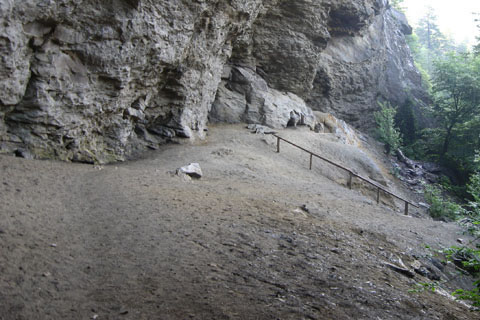| 397 | Hikers Code - Gear | 2011-05-16 |

Alum Cave
You are responsible for yourself, be prepared with gear. (Hike Safe)
Last Thursday, when I hiked the Alum Cave Trail on Mount Le Conte in Great Smoky Mountain National Park, I was surprised by a few trail observations. I discussed the first point, yesterday, in Missing Time - no one wore a watch; but everyone wanted to know the time. Now, the second point - there were many hikers above Alum Cave (a feature 2.5 miles from the trailhead and about halfway to the top of Le Conte) not carrying anything other than a water bottle. Now, most of the hikers I saw were carrying day packs or overnight packs and seemed prepared; but there were hikers and even groups of hikers who were just toting water bottles. They weren't carrying a pack and so I doubt if they were carrying food, extra clothing, rain gear, a first aid kit, map, or a light - or any of the other essentials.
So what were these hikers going to do if they just bonked? You know run out of food and just needed some energy.
or ...
How were they going to threat a minor blister? If not protected a simple hot spot can develop into a painful almost crippling sore; but how were they going to treat any injury without a first aid kit?
or ...
If it began raining, it was predicted and looked threatening, how did these sans packers plan on staying dry and warm? How did they plan on keeping their children dry and warm?
or ...
When their water bottles were empty how were they going to get more water? A 16 ounce bottle of water is slim rations for most hikers on a five mile and close to three thousand foot gain, hike.
or ...
Most of the empty handed hikers were moving very slowly. If the hike continued into the evening, how were they going to see?
or ...
These are but a few examples of simple things that could go wrong on the trail. That is why experienced hikers at least pack the ten essentials on every hike. If you accept the responsibility for your safety, you will carry a pack filled with needed gear.
A few being prepared with gear tips ...
Always carry the essentials.
Know how to use the gear you have in your pack.
On short hikes, still consider which of the essentials you might need. You might be able to simplify some items. For example, a large plastic leaf/trash bag can substitute as a lightweight rain coat and emergency shelter. Using a trash bag as a rain coat is not very comfortable; but would suffice in an emergency.
Plan for a snack every hour on hard uphill trails. On easier trails, snacks can be spaced to every two to three hours.
Carry extra clothing that would make the most extreme temperatures and conditions expected tolerable.
Some gear can be shared with your partner; but make sure someone is carrying the needed gear. For example, everyone in the group might not need a water filter; but just make sure that the hiker that is supposed to be carrying the water filter has it in his pack before leaving the trailhead.
Carrying broken, disabled, or unusable gear is worse than not carrying anything. Make sure everything works and is in good order before leaving the trailhead. Take care of your gear.
Plan your trip using a map and data from a guidebook or online guide. Look for waypoints and their mileages. Also examine the information for the location of potential water sources, rest stops, and unusually difficult or hazardous sections of the trail. Pack gear to match the needs of your findings.
If you are solo hiking, you must carry a little bit more of everything. Call it, just in case gear, because there is no one to help you.
As a hiker, you should accept the responsibility for your own safety on the trails. Carrying the ten essentials plus other trip specific items will equip you with the gear you need to handle emergencies.
Happy responsible gear trails
Hikers Code - Leave Your Plans